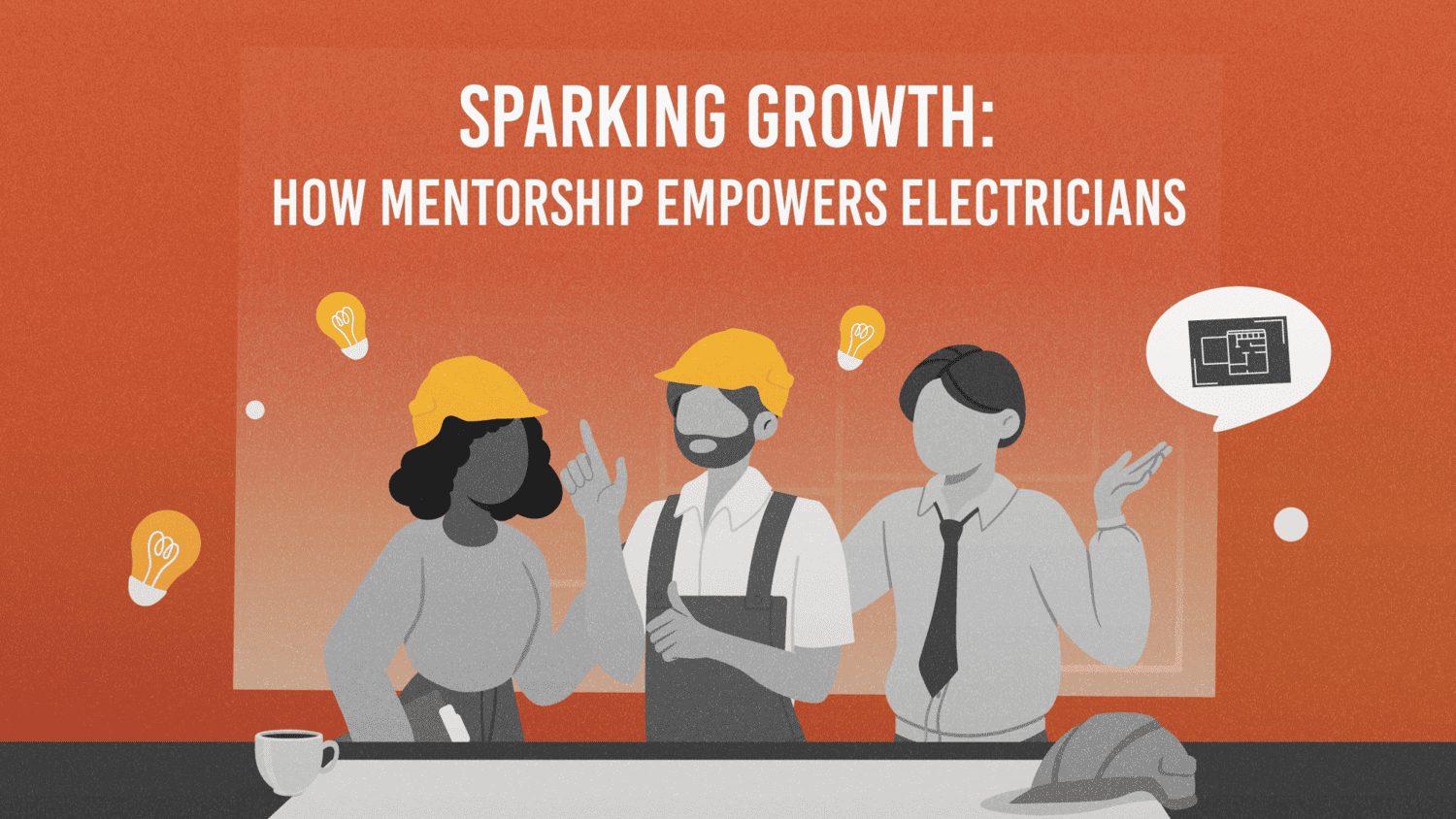In skilled trades, particularly in professions like electrical work, mentorship for electricians brings them closer to success. Here, where precision and expertise are as vital as the tools in one’s belt, the role of mentorship cannot be overstated. Mentorship is indispensable in skilled trades like electrical work, where expertise is cultivated through hands-on experience and technical proficiency. Mentors serve as guides, sharing their knowledge, promoting safety, and fostering personal and professional growth.
76% of employees think that mentorship is important as it propels their career forward instead of staying stagnant. With 9 in 10 workers expressing they are happy with their jobs if they have a career mentor, skilled workers, and contractors need to consider participating in a mentorship program. Can mentorship be a good approach to empower the skills and career of an electrician? Let’s find out more.
The Role of Mentorship in Skill Development
Mentorship for electricians is indispensable in the skill development of their careers. Through mentorship, electricians not only gain proficiency in electrical work but also develop the confidence and professionalism necessary for success in their careers. Here are some approaches:
- Continual Learning: Even experienced electricians benefit from mentorship as they continue to refine their skills throughout their careers. Mentors provide insights, share best practices, and offer guidance on new techniques, technologies, and industry standards.
- Specialization: Electricians may seek mentorship to specialize in specific areas of electrical work, such as industrial installations, renewable energy systems, or smart home automation. Mentors with expertise in these areas can provide targeted training and mentorship to help electricians develop specialized skills.
- Professional Growth: Mentorship fosters professional growth by encouraging electricians to set goals, pursue certifications, and seek out opportunities for advancement. Mentors can offer advice on career development strategies, networking, and continuing education to support electricians in achieving their professional aspirations.
- Problem-Solving and Innovation: Mentors challenge electricians to think critically, solve problems creatively, and innovate in their work. By sharing their own experiences and insights, mentors help electricians develop the ability to overcome challenges and adapt to changing circumstances in their field.
- Leadership Development: As electricians gain experience, mentorship can help them develop leadership skills to effectively supervise and mentor others. Mentors guide communication, team management, and conflict resolution, preparing electricians to take on leadership roles within their organizations.
- Ethical and Professional Standards: Mentorship instills a commitment to ethical conduct, professionalism, and quality workmanship among electricians. Mentors lead by example, emphasizing the importance of integrity, accountability, and customer satisfaction in all aspects of their work.
Understanding Mentorship in the Electrical Industry
Mentorship for electricians involves a structured relationship between an experienced professional (the mentor) and a less experienced individual (the mentee), aimed at supporting the mentee’s career development, skill acquisition, and personal growth within the electrical industry. The mentor serves as a guide, providing advice, sharing knowledge, and offering support to help the mentee navigate challenges, set goals, and achieve success in their career. Mentorship relationships may take various forms, including formal programs established within organizations or informal arrangements between individuals.
One of the primary benefits of mentorship for electricians is the transfer of knowledge and expertise from experienced mentors to mentees. Mentors share insights, tips, and best practices acquired through years of experience, helping mentees develop a deeper understanding of electrical systems, techniques, and industry standards.
For businesses that incorporated mentorship, 70% of them have reported an increase in their productivity and 55% felt the positive impact of mentoring on their profits. It even extends to better retention rates and loyalty of employees – both for the mentees and the mentors. This goes to show how valuable mentorship is, not just for the employees but for the benefit of the contractor as well.
Qualities of a Good Mentor
- Experience: A good mentor for electricians should have extensive experience in the field. They should have a deep understanding of electrical systems, codes, regulations, and best practices gained through years of practical work.
- Expertise: Beyond experience, a mentor should possess expertise in specific areas of electrical work, such as residential, commercial, industrial, or specialized systems like renewable energy or automation. This expertise allows them to provide targeted guidance and support to mentees.
- Patience: Patience is essential when mentoring electricians, especially those who are new to the field or facing challenges in learning complex concepts or techniques. A good mentor takes the time to explain concepts thoroughly, answer questions, and provide constructive feedback without becoming frustrated or impatient.
- Ethical Integrity: Ethical integrity is paramount in mentorship. A good mentor leads by example, demonstrating honesty, integrity, and professionalism in all aspects of their work. They uphold ethical standards, adhere to safety regulations, and prioritize the well-being of their mentees and clients.
- Commitment to Growth: A good mentor is committed to the growth and development of their mentees. They invest time and effort in mentoring relationships, providing ongoing guidance, feedback, and opportunities for learning and skill development. They celebrate mentees’ successes and support them through challenges, fostering a culture of continuous improvement and excellence.
Finding a Mentor in the Electrician Field
One of the most effective ways to find a mentor in the electrical sector is through networking. Attend industry events, such as conferences, trade shows, or workshops, where you can meet experienced professionals in the field. Take the opportunity to introduce yourself, express your interest in finding a mentor, and inquire whether they would be willing to offer guidance and support. Don’t overlook the potential for mentorship within your own workplace. Reach out to experienced colleagues or supervisors whom you admire and respect, and inquire whether they would be willing to mentor you. These individuals may already be familiar with your work ethic and skills, making them ideal candidates for mentorship.
Creating structured mentorship programs within companies and organizations can be a highly effective way to support the professional development and growth of electricians. Identify participants for the mentorship program, including both mentors and mentees. Mentors should be experienced electricians with a demonstrated track record of success and a willingness to share their knowledge and expertise. Mentees can be less experienced electricians or individuals who are new to the industry and seeking guidance.
Tips for Effective Mentoring in the Electrical Industry
Effective mentoring in the electrical industry is essential for fostering the development of skilled professionals and maintaining high standards of excellence. Clearly define the objectives and expectations of the mentoring relationship from the outset. Outline specific goals for skill development, career advancement, and personal growth, and discuss how these goals will be achieved collaboratively. Offer regular feedback and support to your mentee, both in terms of their technical skills and their overall professional development. Recognize their strengths and areas for improvement, and provide constructive guidance on how they can continue to grow and excel in their career.
Beyond the mentorship activity, ensure that electricians have access to a variety of learning resources to support their ongoing development. This may include access to technical manuals, reference guides, online tutorials, and educational websites. Organizations can also invest in subscription-based platforms or online libraries that provide access to a vast array of resources on electrical topics.
If you’re the mentor, offer guidance on skill development tailored to the electrician’s current level of expertise and career aspirations. Identify areas where they can improve and provide resources, advice, and support to help them enhance their skills. Draw from your own experiences as an electrician to provide practical insights and lessons learned. Share stories of challenges you’ve faced, mistakes you’ve made, and strategies you’ve used to overcome obstacles in your career.
As a mentee, look for a mentor who has expertise and experience in areas relevant to your goals and interests. Consider reaching out to experienced electricians or industry professionals whom you admire and respect. Take initiative in your mentorship relationship by actively seeking opportunities to learn and grow. Don’t wait for your mentor to assign you tasks or provide guidance – take the initiative to ask questions, seek advice, and take on new challenges independently.
Final Thoughts
Active participation from both mentors and mentees is crucial for the success of mentorship programs in the electrical industry. By actively participating in mentorship programs, both mentors and mentees contribute to the cultivation of a skilled and knowledgeable workforce within the electrical industry. Together, they form a symbiotic relationship built on mutual respect, trust, and a shared commitment to excellence. Through their active engagement in mentorship programs, mentors and mentees alike pave the way for continued growth, innovation, and success within the field of electrical work.





